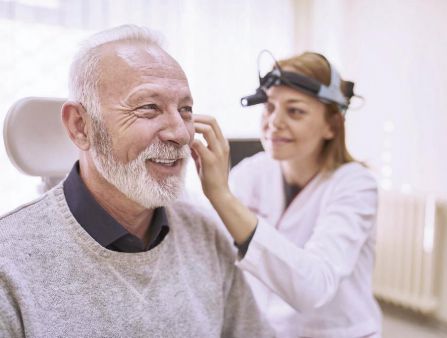WHAT'S HAPPENING
BIPARTISAN LEGISLATION ALLOWS DIRECT ACCESS TO MEDICARE COVERAGE FOR AUDIOLOGICAL SERVICES
American Academy of Audiology has strongly endorsed legislation currently before the House and the Senate to improve outcomes for seniors by allowing direct access to audiological services and streamlining Medicare coverage policies so that audiologists can provide the full range of Medicare-covered diagnostic and treatment services.

SOUND POLICY: "Allowing audiologists to fully participate in Medicare will provide seniors with improved access to hearing health and balance care."
Representatives Gus Bilirakis (R-Fla) and Matt Cartwright (D-Penn) introduced the Medicare Audiology Access Improvement Act (H.R. 6445) in the House. Identical legislation (S.2377) was also introduced by Senators Elizabeth Warren (D-Mass) and Chuck Grassley (R-Iowa) and Rand Paul (RKy.) in the Senate.
This legislation would remove the physician order requirement, reclassify audiologists as practitioners, and allow audiologists to provide Medicare-covered treatment services within their scope of practice. Further expanding access to audio-vestibular care, this legislation would also add audiologists as practitioners to Federally Qualified Health Centers and Rural Health Clinics. The legislation has been endorsed by the National Association of Rural Health Clinics.
"Medicare reimbursement policies should be patient-centered and maximize patient choice whenever possible," said Congressman Bilirakis. "Updating these policies to allow licensed audiologists to fully participate in Medicare will bring greater parity and provide seniors with improved access to hearing health and balance care."
According to the National Institute of Health's National Library of Medicine, the U.S. will have more than 70 million seniors by the year 2030. Seniors are the largest population of Americans with hearing loss. Hearing loss impacts communication and functional ability and is strongly associated with decreased quality of life, cognitive decline and depression.
In addition, there are other studies that demonstrate the link between hearing and dementia and falls in seniors. A study published by the Lancet Commission on Dementia Prevention, Intervention and Care cited 11 risk factors for dementia including hearing impairment in mid-life. The report also stated that dementia typically starts many years before it is recognized. Untreated hearing loss can impact the brain and cognitive health.
There is also a link between untreated hearing loss and falls. According to a study conducted by Johns Hopkins University School of Medicine, an increase in hearing loss in an individual, for instance going from normal hearing to an untreated mild hearing loss, is associated with a three-fold increase in fall risk.
"Age related hearing loss is one of the most common conditions affecting older adults. Left untreated, it can lead to other health risks including dementia and falls," said Congressman Cartwright. "Outdated Medicare rules make it difficult for seniors with hearing loss to get the care they need. That's why I'm glad to be working with my colleagues across the aisle to ensure seniors can access a full range of hearing and balance health care services provided by licensed audiologists."
“Advancing this legislation is necessary to remove outdated barriers that prevent older Americans from receiving the hearing health and balance care coverage that they need and deserve,” said American Academy of Audiology President Bopanna Ballachanda, Ph.D. “Treating hearing loss and balance disorders improves individual’s ability to communicate and connect with loved ones, decreases risk for falls and results in greater overall quality of life. Passage of this cost-effective legislation will give patients timely access to these services and strengthen support for seniors’ mental health and mental acuity in the process.”
In addition to endorsement of this landmark legislation by the American Academy of Audiology, other endorsers include the Academy of Doctors of Audiology, American Speech-Language Association and the Hearing Loss Association of America.
For more information, visit audiology.org •
ABOUT THE AMERICAN ACADEMY OF AUDIOLOGY:
AMERICAN ACADEMY OF AUDIOLOGY
The American Academy of Audiology serves as the collective voice of audiology. It is committed to advancing the science, practice, and accessibility of hearing and balance health care for thier patients. Representing the interests of audiologists and future audiologists nationwide, the Academy is dedicated to fulfilling its mission: providing quality hearing-care services through professional development, education, research, and increased public awareness of hearing and balance disorders. The American Academy of Audiology is the world's largest professional organization of, by and for audiologists. For more information, visit audiology.org